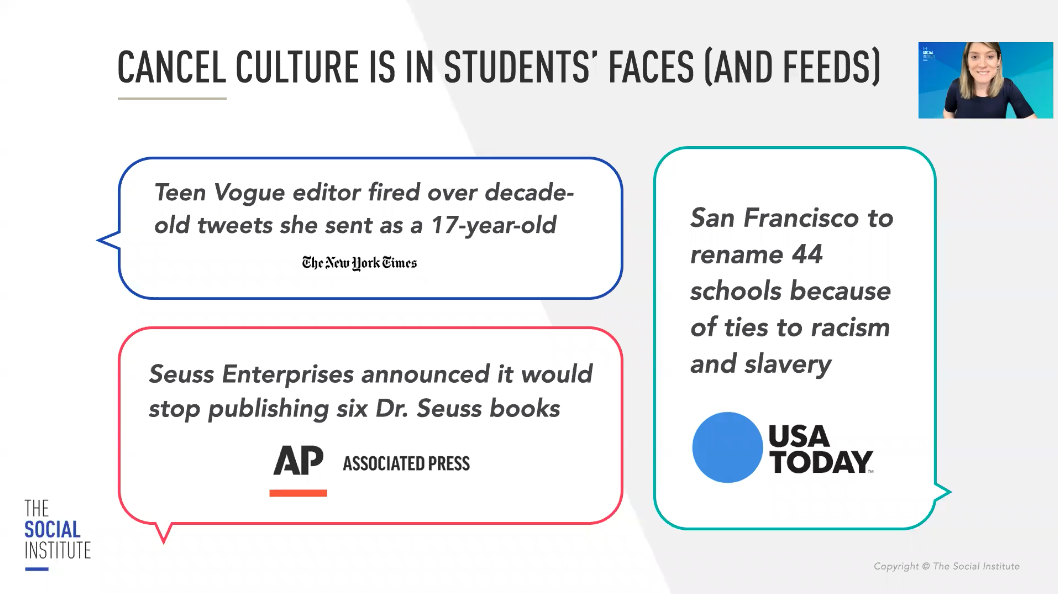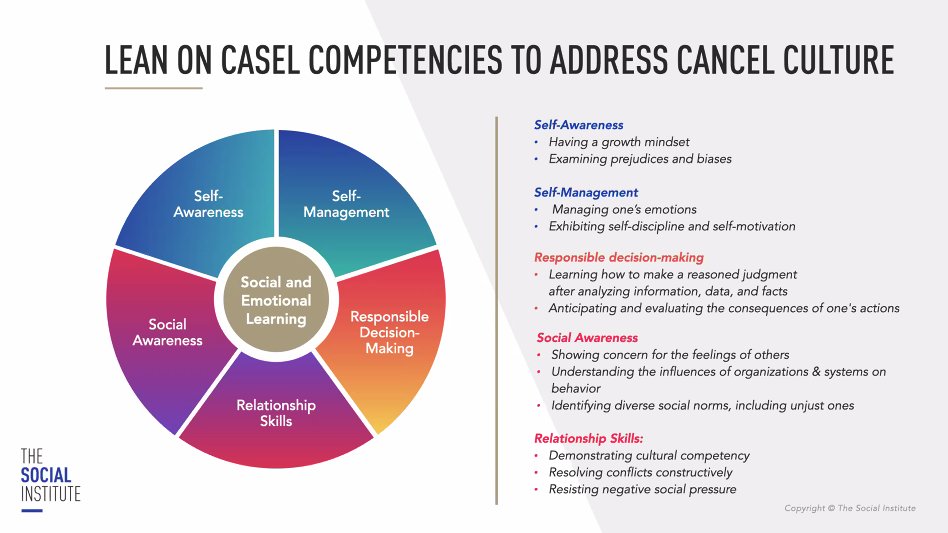Webinar Recap: Navigating cancel culture and the impact on student well-being
According to Google Trends, interest in cancel culture is literally at an all-time high in 2021. Today’s 24/7 non-stop news cycle keeps polarizing stories in social media feeds, on front pages, and at the forefront of our collective consciousness. From Dr. Seuss to Charli D’Amelio, schools to military bases, and Mr. Potato Head to Aunt Jemima, cancel culture controversies swirls around a broad spectrum of topics.
A national trend of cancel culture is creeping into classrooms and putting teachers on the spot with managing complex and, often, emotional situations with students. It’s never been easier for students to voice their thoughts and opinions on hot-button topics. Creating TikToks, posting Instagram stories, sending out Snaps, and reposting content that reflects what they think fuels discussion with the potential to impact entire student bodies.
The Social Institute’s Founder and CEO Laura Tierney recently hosted a 30-minute SEL webinar focused on the intersection of cancel culture and social media. The interactive session explored the direct link to critical social-emotional learning competencies and how schools can address them.
Watch the full webinar here.

Merriam-Webster officially added ‘cancel culture’ to the dictionary in 2021, signaling its broad acceptance into the daily lexicon. It defined cancel culture as “the practice or tendency of engaging in mass canceling as a way of expressing disapproval and exerting social pressure.”
Earlier this semester, The Social Institute launched a #WinAtSocial LIVE lesson about cancel culture and the insights from students are telling.
- 73% of 9th-12th grade students say that cancel culture has come up in conversations with friends or family
- 6% of 5th-12th grade students believe that cancel culture is effective for holding others accountable
- 41% of 5th-12th grade students believe that it creates more problems than it solves
Cancel culture directly impacts communities as some experts believe it creates an unhealthy “us” vs. “them” dichotomy. According to Kimberley Wilson, psychology and author of How to Build a Healthy Brain, “Fundamentally, cancel culture is about shame and the fact that for the canceled person it can feel as though the whole world is attacking them.” The most considerable backlash of cancel culture stems from its desire to cancel someone rather than pursue growth and acknowledgment permanently.
Prioritizing social-emotional learning addresses many of the compounding issues surfaced by cancel culture.

TSI’s #WinAtSocial Program, which aligns with the CASEL framework, helps students navigate challenging conversations and proactively sharpen the soft skills needed to process complex situations. Schools can help students build awareness of what they post and how others can interpret it by promoting and infusing CASEL competencies into relatable, everyday classroom discussions.
For a complete breakdown of cancel culture through the lens of students, along with specific steps schools can take to address it, WATCH the full webinar.
You can also check out our regularly updated webinar schedule for upcoming timely webinars featuring guest thought leaders and updated research and insights.
About The Social Institute
The Social Institute (TSI) is the leader in empowering students by understanding students. Through #WinAtSocial, our gamified, peer-to-peer learning platform, we equip students, educators, and families to navigate their social world – in the classroom and beyond, online and offline – in healthy, high-character ways. Our unique, student-respected approach empowers and equips, rather than scares and restricts. We incorporate timely topics about social media, tech use, and current events that are impacting student well-being and learning. #WinAtSocial Lessons teach life skills for the modern day, capture student voice, and provide school leaders with actionable insights. Through these insights, students play an essential role in school efforts to support their own health, happiness, and future success as we enable high-impact teaching, meaningful family conversations, and a healthy school culture.